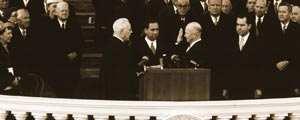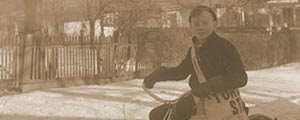In August 1949, at a time of high business-labor tension following a rash of industrial strikes, Philip Willkie, the son of a famous American businessman, proposed an unusual solution -- defusing things over a nice meal. More specifically, he proposed lunch clubs in cities around the country to facilitate better understanding between labor and management. And according to a 1949 Â鶹´«Ã½AV poll testing the concept, Americans ate it up: 71% were in favor, and just 17% opposed.
| Sept. 28-Oct. 2, 1949 | |||||||||||||||||||||||||||||||||||||||||||||||||||||||||||||||||||||||||||||||||||||||||||||||||||
|---|---|---|---|---|---|---|---|---|---|---|---|---|---|---|---|---|---|---|---|---|---|---|---|---|---|---|---|---|---|---|---|---|---|---|---|---|---|---|---|---|---|---|---|---|---|---|---|---|---|---|---|---|---|---|---|---|---|---|---|---|---|---|---|---|---|---|---|---|---|---|---|---|---|---|---|---|---|---|---|---|---|---|---|---|---|---|---|---|---|---|---|---|---|---|---|---|---|---|---|
| % | |||||||||||||||||||||||||||||||||||||||||||||||||||||||||||||||||||||||||||||||||||||||||||||||||||
| Favor | 71 | ||||||||||||||||||||||||||||||||||||||||||||||||||||||||||||||||||||||||||||||||||||||||||||||||||
| Oppose | 17 | ||||||||||||||||||||||||||||||||||||||||||||||||||||||||||||||||||||||||||||||||||||||||||||||||||
| No opinion | 12 | ||||||||||||||||||||||||||||||||||||||||||||||||||||||||||||||||||||||||||||||||||||||||||||||||||
| Â鶹´«Ã½AV | |||||||||||||||||||||||||||||||||||||||||||||||||||||||||||||||||||||||||||||||||||||||||||||||||||
The Â鶹´«Ã½AV write-up explained that the poll found widespread support for the proposal among labor union members (71% in favor), as well as "business and professional persons" (more than 4-to-1 in favor). While it's not clear what the downside to such an arrangement would be for either side to oppose it, perhaps that's what drew Willkie to the idea.
Philip Willkie was an Indiana state legislator in 1949 and son of the 1940 Republican presidential nominee, Wendell Willkie. George Â鶹´«Ã½AV explained that one of the reasons the younger Willkie weighed in with his lunch club proposal was that he believed "labor-management strife in America was playing right into the hands of the communists." In addition to several major industrial strikes following World War II, this strife was stoked by corporate pushback against union power, culminating in the congressional passage of the 1947 Taft-Hartley Act.
Â鶹´«Ã½AV quoted Philip Willkie saying, "Business and labor live on different sides of every town. The industrial conflict grows steadily worse. Labor and business meet only in conflict -- around a bargaining table, during a strike, or in a fight for the control of a political or legislative body.
"If labor would listen to business, business ought to be willing to listen to labor. Perhaps this service club formula of men breaking bread together can be put to use for the betterment of the American way of life."
According to his wife, Willkie was someone who had "an idea a minute." However, despite broad public support, this idea never really took off.
Read the original Â鶹´«Ã½AV news story here.
These data can be found in .
Read more from the Â鶹´«Ã½AV Vault.



